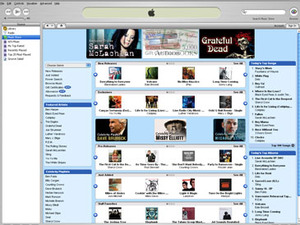
The Road Ahead addresses a wide spectrum of challenges and technologies. Here are a few more we found interesting:
When he's right, he's (mostly) right. In the post-Napster era, it certainly is possible to purchase individual songs rather than having to fork out £12 on a full album. Artists can sell individual tracks or full albums using services such as iTunes but some are embracing the 21st Century more than others. Many bands now have official websites where fans can download exclusive recordings and interviews.
We haven't quite reached the point of pay-per-play; Gates suggests it could be possible to pay just 5 cents to listen to a single track, or 60 cents for the full album. There are services where you pay a monthly fee to listen to high-quality, ad-free digital radio but Gates goes one step further. He proposes that "any place you go where there are audio speakers connected to the highway, you’ll be able to identify yourself and take advantage of your rights." Sound far-fetched? You can already stream your MP3 collection wirelessly around your house using devices such as the Linksys Media Adapter. At the moment, however, the digital audio landscape is still changing very quickly.


(left) Apple's iTunes Music Store can sell you a single track or an entire album. (right) The Linksys Media Adapter allows you to stream music wirelessly around your house
Again, arguably this didn't require any particular genius, but there is no denying that Gates hit this nail right on the head(shot). What you have to remember is that at the time the book was written, "on-line computer-game playing" as we know it today was in its infancy. Multiplayer Doom either required a local network (LAN) or two players had to physically dial each other's houses with a modem in order to play. Who knew that 10 years later, Microsoft themselves would operate the largest online multiplayer network for games consoles, Xbox Live? Maybe Bill did.
Playing board and card games online is hardly a taxing technical achievement, but in the realm of RPG games, online play is king. In fact, online play gave birth to Massively Multiplayer Online (MMO) games, the most famous of which is the MMORPG. World of Warcraft has been likened to crack for its addictive properties, and there are many other popular online persistent universes such as Guild Wars and City of Heroes / Villains.
Tournaments? You betcha! There are annual tournaments from both the World Cyber Games and CPL where 'cyber atheletes' compete for hundreds of thousands of dollars in prize money. These events have spawned a growing group of gamers who tour the circuit attempting to earn enough cash to avoid working a regular 9 to 5 job. Top players, such as Jonathan "Fatal1ty" Wendell, have lucrative commercial endorsements and Korea's top pro-gamers even have their own fan clubs.


(left) Fatal1ty wins again - US$15,000 and all the ladies (right) Korean superstar, Lim Yo-Hwan, has a fan club with 470,000 registered members and earns in excess of US$300,000 per year in prize money and endorsements.
You won’t be drowned by the deluge of unimportant information because you’ll use software to filter incoming advertising and other extraneous messages and spend your valuable time looking at those messages that interest you. Most people will block e-mail ads except for those about product areas of particular concern.
Gosh, wouldn't that be nice? Email spam has vastly exceed the nuisance of paper-based junk mail. It has been forecast that by mid-2006, as much as 95% of all email will actually be spam.
At that point, according to AOL, we would see "the beginning of a slow meltdown of email delivery systems caused by overloaded queues and stressed filters." For some poor souls, we are already experiencing that hell.
What is the solution? In the book, Gates proposed a quaint solution whereby the advertiser would offer a payment in exchange for exposing you to their message. The idea is that you would filter out all the no-fee emails but if someone paid you US$10 to read a message, you would "probably take a look - if not for the money, then just to see who thought reaching you was worth $10." Unfortunately, when you can buy 500 million email addresses for as little as $200, the spammers simply play the numbers game, relying on catching out a fraction of a fraction of recipients.
In January 2004, Gates pledged to rid the world of spam within two years. Microsoft had a "magic solution" we were told though here we are in February 2006 and things are worse than ever. Will it be another ten years before someone cleans up this mess?

Naturally, a man in his position would be privvy to confidential information relating to innovations us consumers wouldn't see for years to come but even so, predicting things like the iPod revolution or the considerable blight that is spam, would have been a tall order indeed.
At the time, The Road Ahead was certainly an interesting read for any geek. There are other areas we haven't had time to examine so if you haven't already read it, pop along to your local library and borrow it for a week. A quick scan of Amazon reveals that it is still available so have a go if it takes your fancy.
Digital Rights Management
The information highway will enable innovations in the way that intellectual property, such as music and software, is licensed. Record companies, or even individual recording artists, might choose to sell music in a new way.... For example, a song could be made available on a pay-per-hearing basis... We may see digital entertainment that has an expiration date or that allows only a certain number of plays before it has to be purchased again.When he's right, he's (mostly) right. In the post-Napster era, it certainly is possible to purchase individual songs rather than having to fork out £12 on a full album. Artists can sell individual tracks or full albums using services such as iTunes but some are embracing the 21st Century more than others. Many bands now have official websites where fans can download exclusive recordings and interviews.
We haven't quite reached the point of pay-per-play; Gates suggests it could be possible to pay just 5 cents to listen to a single track, or 60 cents for the full album. There are services where you pay a monthly fee to listen to high-quality, ad-free digital radio but Gates goes one step further. He proposes that "any place you go where there are audio speakers connected to the highway, you’ll be able to identify yourself and take advantage of your rights." Sound far-fetched? You can already stream your MP3 collection wirelessly around your house using devices such as the Linksys Media Adapter. At the moment, however, the digital audio landscape is still changing very quickly.


(left) Apple's iTunes Music Store can sell you a single track or an entire album. (right) The Linksys Media Adapter allows you to stream music wirelessly around your house
Online Gaming
I think on-line computer-game playing will catch on in a big way. We’ll be able to choose from a rich set of games, including all the classic board and card games as well as action adventure and role-playing games. New styles of games will be invented specifically for this medium. There will be contests with prizes awarded.Again, arguably this didn't require any particular genius, but there is no denying that Gates hit this nail right on the head(shot). What you have to remember is that at the time the book was written, "on-line computer-game playing" as we know it today was in its infancy. Multiplayer Doom either required a local network (LAN) or two players had to physically dial each other's houses with a modem in order to play. Who knew that 10 years later, Microsoft themselves would operate the largest online multiplayer network for games consoles, Xbox Live? Maybe Bill did.
Playing board and card games online is hardly a taxing technical achievement, but in the realm of RPG games, online play is king. In fact, online play gave birth to Massively Multiplayer Online (MMO) games, the most famous of which is the MMORPG. World of Warcraft has been likened to crack for its addictive properties, and there are many other popular online persistent universes such as Guild Wars and City of Heroes / Villains.
Tournaments? You betcha! There are annual tournaments from both the World Cyber Games and CPL where 'cyber atheletes' compete for hundreds of thousands of dollars in prize money. These events have spawned a growing group of gamers who tour the circuit attempting to earn enough cash to avoid working a regular 9 to 5 job. Top players, such as Jonathan "Fatal1ty" Wendell, have lucrative commercial endorsements and Korea's top pro-gamers even have their own fan clubs.


(left) Fatal1ty wins again - US$15,000 and all the ladies (right) Korean superstar, Lim Yo-Hwan, has a fan club with 470,000 registered members and earns in excess of US$300,000 per year in prize money and endorsements.
Spam
Direct-response advertising – the junk-mail business – is in for even bigger changes. Today, a lot of it really is junk, because we cut down a lot of trees in order to mail out material, much of which is discarded unopened. Direct-response advertising on the information highway will come in the form of an interactive multimedia document rather than a piece of paper. Although it won’t waste natural resources, there will have to be some way to make sure you don’t get thousands of these almost-free communications a day.You won’t be drowned by the deluge of unimportant information because you’ll use software to filter incoming advertising and other extraneous messages and spend your valuable time looking at those messages that interest you. Most people will block e-mail ads except for those about product areas of particular concern.
Gosh, wouldn't that be nice? Email spam has vastly exceed the nuisance of paper-based junk mail. It has been forecast that by mid-2006, as much as 95% of all email will actually be spam.
At that point, according to AOL, we would see "the beginning of a slow meltdown of email delivery systems caused by overloaded queues and stressed filters." For some poor souls, we are already experiencing that hell.
What is the solution? In the book, Gates proposed a quaint solution whereby the advertiser would offer a payment in exchange for exposing you to their message. The idea is that you would filter out all the no-fee emails but if someone paid you US$10 to read a message, you would "probably take a look - if not for the money, then just to see who thought reaching you was worth $10." Unfortunately, when you can buy 500 million email addresses for as little as $200, the spammers simply play the numbers game, relying on catching out a fraction of a fraction of recipients.
In January 2004, Gates pledged to rid the world of spam within two years. Microsoft had a "magic solution" we were told though here we are in February 2006 and things are worse than ever. Will it be another ten years before someone cleans up this mess?

The $51 billion crystal ball
As could be expected, and indeed was predicted by Gates at the time of the book's writing, the success rate of his predictions was somewhat hit and miss.Naturally, a man in his position would be privvy to confidential information relating to innovations us consumers wouldn't see for years to come but even so, predicting things like the iPod revolution or the considerable blight that is spam, would have been a tall order indeed.
At the time, The Road Ahead was certainly an interesting read for any geek. There are other areas we haven't had time to examine so if you haven't already read it, pop along to your local library and borrow it for a week. A quick scan of Amazon reveals that it is still available so have a go if it takes your fancy.

MSI MPG Velox 100R Chassis Review
October 14 2021 | 15:04








Want to comment? Please log in.